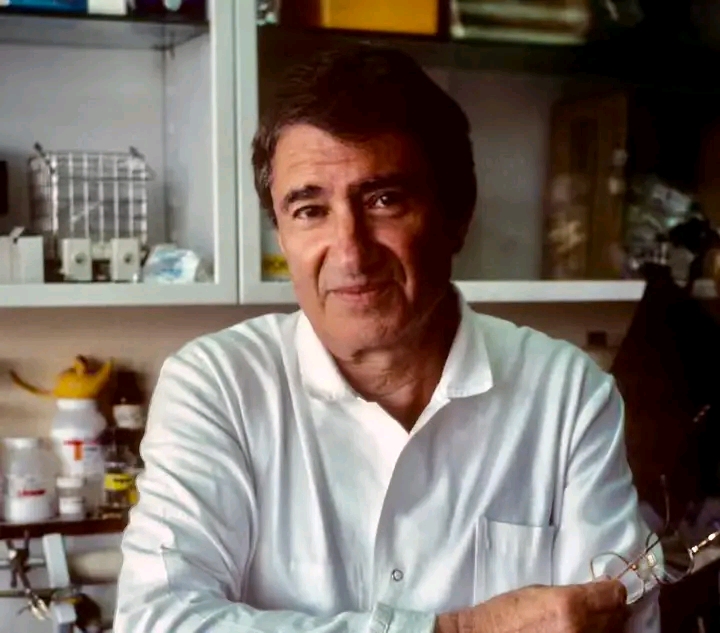On May 30, 2025, the world bid farewell to Étienne-Émile Baulieu, the French biochemist and endocrinologist whose groundbreaking work reshaped reproductive health and aging science.
Best known as the “father of the abortion pill,” Baulieu’s development of mifepristone (RU-486) revolutionized women’s reproductive rights and ignited global debates on medical ethics and autonomy.
But his legacy extends far beyond a single drug, his life was a combination of scientific brilliance, moral courage, and an unwavering commitment to human dignity, despite the odds.
Early Life
Born Étienne Blum on December 12, 1926, in Strasbourg, France, Baulieu was raised in a Jewish family deeply rooted in intellectual and medical traditions. His father, Léon Blum, was a pioneering nephrologist who died when Étienne was just three years old.
Raised by his feminist mother alongside his sisters, his early life was marked by resilience and a strong sense of justice.
During World War II, as a teenager, he joined the French Resistance, adopting the pseudonym “Émile Baulieu” to conceal his identity.
After the war, Baulieu pursued medical studies at the Faculté de Médecine de Paris, earning his medical degree in 1955. He furthered his education with a Ph.D. in biochemistry in 1963, focusing on steroid hormones, a field that would become his life’s work.
His early research centered on dehydroepiandrosterone (DHEA), a hormone produced by the adrenal glands. Baulieu’s work in identifying DHEA as a key adrenal androgen laid the foundation for his future discoveries in endocrinology and neurobiology.
Scientific Breakthroughs
Baulieu’s research on DHEA led him to explore its role in aging and cognitive function. He discovered that DHEA and its sulfate form (DHEAS) were not only produced by the adrenal glands but also synthesized in the brain, coining the term “neurosteroids” in 1981.
His studies revealed that neurosteroids like DHEA and pregnenolone play crucial roles in modulating mood, memory, and neuroprotection. This work also suggested that these hormones could potentially mitigate age-related cognitive decline and neurodegenerative diseases such as Alzheimer’s.

In 2000, he co-authored the DHEAge Study, which examined the effects of DHEA supplementation in elderly individuals. The study found improvements in skin hydration, bone density, and libido among postmenopausal women, highlighting DHEA’s potential as an anti-aging therapy.
Baulieu’s pioneering work in neurosteroids opened new avenues for understanding the biochemical underpinnings of aging and mental health.
The Birth of RU-486
In the late 1970s, Baulieu turned his attention to reproductive health, focusing on the hormone progesterone, which is essential for maintaining pregnancy. Collaborating with the French pharmaceutical company Roussel-Uclaf, he sought to develop a compound that could block progesterone’s action.
This collaboration led to the synthesis of RU-486, later known as mifepristone. The drug effectively induced abortion by inhibiting progesterone receptors, offering a non-surgical alternative for early pregnancy termination.
Baulieu’s advocacy was instrumental in bringing the drug to market in France in 1988, despite significant political and social opposition.
Mifepristone’s approval in the United States came in 2000, after years of controversy and regulatory hurdles. Today, it is used in over 60% of abortions in the U.S., underscoring its profound impact on reproductive healthcare.
Later Years
In his later years, he continued to explore the intersections of hormones, aging, and neurodegeneration. He founded the Institut Baulieu in 2008 to advance research on aging and neurodegenerative diseases, including Alzheimer’s.
Baulieu’s work emphasized the potential of DHEA and other neurosteroids in promoting healthy aging and cognitive function. He advocated for a holistic approach to aging, combining hormonal therapies with lifestyle interventions.
His contributions extended beyond the laboratory, as he served as president of the French Academy of Sciences from 2003 to 2004 and was a member of the National Academy of Sciences in the U.S. He also participated in France’s National Ethics Advisory Committee, influencing policy on bioethics and public health.

Baulieu remained active in research and public discourse well into his 90s, embodying a lifelong dedication to science and societal progress.
Honors and Recognition
Baulieu’s groundbreaking work earned him numerous accolades throughout his career. In 1989, he received the Albert Lasker Award for Clinical Medical Research, often referred to as “America’s Nobel.”
He was also honored with the Grand Officier of the Légion d’honneur in 1990, one of France’s highest distinctions.
His election to prestigious institutions, including the French Academy of Sciences and the National Academy of Sciences in the U.S., reflected his global impact on science and medicine.
Baulieu’s influence extended beyond academia; he was a public intellectual who engaged with ethical and social issues related to his research.
He authored several books, including “The Abortion Pill,” which detailed the development and implications of mifepristone. His writings and lectures inspired generations of scientists, physicians, and advocates for women’s health.
Personal Life
Baulieu’s personal life was as dynamic as his professional one. He was known for his relationships with prominent cultural figures, including a reported romance with Italian actress Sophia Loren and a friendship with artist Niki de Saint Phalle.
He was married to Yolande Compagnon, with whom he had three children, before their divorce. In 2016, he married Simone Harari, a French film and television producer. Baulieu was a father, grandfather, and great-grandfather, cherishing his family alongside his scientific pursuits.
His office reflected his eclectic interests, adorned with art pieces and memorabilia from his collaborations and friendships. He also believed in the importance of scientists engaging with the public, stating that being a public figure was essential for explaining the significance of science to society.
Final Thoughts on Étienne-Émile Baulieu
Although Étienne-Émile has passed away, his scientific legacy continues through the ongoing work of the Institut Baulieu and its collaborators. The institute remains at the forefront of research into aging and neurodegenerative diseases, focusing on innovative approaches to understanding and treating conditions like Alzheimer’s disease.
One of the institute’s significant research areas involves the FKBP52 protein, which Baulieu’s team identified as interacting with the pathological Tau protein implicated in Alzheimer’s disease.
Studies have shown that decreased levels of FKBP52 correlate with increased Tau pathology, suggesting that modulating FKBP52 could be a therapeutic strategy. Recent research continues to explore this interaction, aiming to develop interventions that can prevent or slow the progression of neurodegenerative diseases.
Additionally, Baulieu’s work on neurosteroids, particularly DHEA, has opened new avenues for understanding brain aging and cognitive decline. The institute’s ongoing studies investigate how these hormones influence brain function and how they might be harnessed to promote healthy aging.
Through these research endeavors, the Institut Baulieu continues to honor his commitment to scientific innovation and his dedication to improving human health.
Frequently Asked Questions
1. Who was Étienne-Émile Baulieu?
A French biochemist and endocrinologist renowned for developing the abortion pill mifepristone (RU-486) and pioneering research in steroid hormones and neurosteroids.
2. What is RU-486?
RU-486, or mifepristone, is a medication that blocks the hormone progesterone, effectively terminating early pregnancies.
3. How did Baulieu contribute to reproductive rights?
By developing mifepristone, he provided a non-surgical option for abortion, significantly impacting women’s reproductive autonomy.
4. What are neurosteroids?
Steroids synthesized in the brain that influence neuronal activity, mood, and cognitive functions.
5. What is DHEA?
Dehydroepiandrosterone (DHEA) is a hormone produced by the adrenal glands, involved in aging and cognitive function.
6. What is the Institut Baulieu?
A research institute founded by Baulieu focusing on aging, neurodegenerative diseases, and hormonal research.
7. What is FKBP52?
A protein that interacts with the Tau protein; modulating FKBP52 levels may influence the progression of Alzheimer’s disease.
8. What honors did Baulieu receive?
Awards include the Albert Lasker Award, Grand Officier of the Légion d’honneur, and membership in the French Academy of Sciences.
9. Did he write any books?
Yes, including “The Abortion Pill” and “Neurosteroids: A New Regulatory Function in the Nervous System.”
10. What was Baulieu’s role in the French Resistance?
As a teenager, he joined the Resistance during World War II, adopting a pseudonym to conceal his identity.
11. What is the significance of mifepristone today?
It remains a widely used medication for medical abortions worldwide.
12. How did Baulieu’s work impact Alzheimer’s research?
His studies on FKBP52 and Tau proteins opened new therapeutic avenues for neurodegenerative diseases.
13. What is the DHEAge Study?
A study co-authored by Baulieu examining the effects of DHEA supplementation in elderly individuals.
14. What is MAP4343?
A synthetic neurosteroid developed to treat depression and addiction without hormonal side effects.
15. Did Baulieu have any notable personal relationships?
He was married to Yolande Compagnon and later to Simone Harari; he also had friendships with cultural figures like Andy Warhol.
16. What is the role of neurosteroids in aging?
They may protect against cognitive decline and support brain health in the elderly.
17. How did Baulieu’s work influence bioethics?
He served on France’s National Ethics Advisory Committee, shaping policies on medical ethics.
18. What is the current research focus of the Institut Baulieu?
Investigating the molecular mechanisms of aging and developing therapies for neurodegenerative diseases.
19. How is FKBP52 being studied in Alzheimer’s research?
Researchers are exploring how modulating FKBP52 levels can affect Tau pathology and disease progression.
20. What is Baulieu’s legacy?
A trailblazer in endocrinology and neuroscience, his work continues to influence medical research and women’s health rights.
































